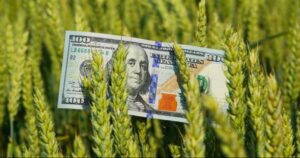
JSC Ukrzaliznytsia will install electric generators and heaters received from the Red Cross Society of Ukraine at railway stations.
As reported in the Telegram channel of UZ, the generators will operate at stations in Zaporozhye (two stations), Vinnitsa, Khmelnitsky, Kamenetz-Podolsky, Berdichev, Rivne, Krivoy Rog (two stations), Kovel, Kolomyia, Mukachevo, Truskavets, Morshyn , Zhmerinka, Ivano-Frankivsk, Chernivtsi, Chop, Uzhgorod, Zhytomyr, Mironovka, Chernihiv, Trostianets, Sumy, Kharkiv, Odessa, Cherkassy, Kropyvnytskyi, Ternopil, Lvov (two stations) and at the stations “Taras Shevchenko” and “Darnitsa” in Kyiv.
The total cost of humanitarian aid is about UAH 12 million.
In addition, last week Ukrzaliznytsia received 154 water heaters from the Ukrainian Red Cross Society, which were distributed among 79 railway stations.

Oil prices are falling on Wednesday morning after a moderate rise the day before, caused by concerns about the supply of fuel on the world market and the weakening dollar.
The price of December futures for Brent on London’s ICE Futures exchange is $92.79 per barrel by 8:08 qoq, which is $0.73 (0.78%) lower than the closing price of the previous session. As a result of trading on Tuesday, these contracts rose by $0.26 (0.3%) to $93.52 per barrel.
The price of futures for WTI oil for December in electronic trading on the New York Mercantile Exchange (NYMEX) is $84.84 per barrel by this time, which is $0.48 (0.56%) lower than the final value of the previous session. A day earlier, the contract rose in price by $0.74 (0.9%) to $85.32 per barrel.
The ICE-calculated index, which shows the dynamics of the dollar against six currencies (the euro, the Swiss franc, the yen, the Canadian dollar, the pound sterling and the Swedish krona), lost about 1% on the eve, which supported oil quotes.
In addition, the market on Tuesday reacted to statements by Saudi Energy Minister Prince Abdulaziz bin Salman that the lack of strategic reserves of raw materials and free mining capacity could become painful for the market in the coming months.
Meanwhile, the American Petroleum Institute (API) reported Tuesday night that U.S. inventories rose by 4.5 million barrels last week. Experts, on average, expected a more moderate growth, in the region of 200,000 barrels.
Official data from the Energy Information Administration of the US Department of Energy will be released on Wednesday at 17:30 qoq, and analysts polled by Trading Economics predict that the report will indicate an increase in oil inventories by 1.03 million barrels and a decrease in gasoline reserves by 0.8 million barrels.

GC “Prometey” (Nikolaev) did not receive a refund of value added tax (VAT) in January 2022, in total, the grain trading group was not paid fiscal compensation in the amount of UAH 112 million, the company said in a press release on Monday.
At the same time, she points out that the State Tax Service (STS) is conducting a selective VAT refund, and accuses it of delaying its return by conducting lengthy business audits.
“As reported by the tax authorities themselves, and according to business representatives, in parallel (with the lack of VAT refunds – IF), thorough checks were launched. Informally, the purpose of these audits is to delay refunds, since some enterprises did not receive payments for January and do not have information when this process is de facto launched,” the group of companies said.
The corresponding transition of the economy to manual mode leaves the transition to the “shadow” as the only option for companies to continue their activities, the grain trader emphasizes.
“It is not clear that the business is already receiving refunds, the losses of which are not comparable with the “war” costs of agro-exporters – a strategic direction for the Ukrainian economy. In particular, members of the Ukrainian Association of Furniture Manufacturers claim to receive compensation payments. on the brink of profitability, are still waiting in line to receive refunds,” the press release says.
The grain trader stressed that for Ukrainian agro-industrial companies the issue of the actual VAT refund is not just a positive event, but a necessary condition for survival in the market.
According to the company, due to the unstable situation in Nikolaev, all data on VAT refund payments to the exporter are in the jurisdiction of the tax Volyn region, which does not show any interest in resolving the issue of its reimbursement to Prometheus.
“The company is one of the few that has not closed that part of its business that is located in the Nikolaev region and is in close proximity to the front line. At the same time, more and more taxpayers in Nikolaev have already stopped or closed. Perhaps this is the reason, because behind the scenes, applicants for compensation are divided into categories, and front-line companies are clearly not favorites for fiscal authorities,” the grain trader stated.
“Of course, now the country’s priority is financing defense and security, but selective non-reimbursement of VAT is the transition of the economy to manual mode, and does the authorities leave with this practice only one alternative to agribusiness – transition to the shadow?”, – he added in a press release. .
GC “Prometheus” provides services for the storage, processing and logistics of grain and leguminous crops on the basis of 29 elevators in Mykolaiv, Kirovograd, Kyiv, Khmelnytsky, Zaporozhye, Sumy, Odessa, Kherson and Dnepropetrovsk regions.
At the end of 2021, the group of companies planned to receive $45 million in EBITDA, while in 2020 this figure reached $32.6 million, and in 2019 – $30.5 million.

Metallurgical enterprises of Ukraine in September of this year reduced steel production by five times, or by 80%, compared to the same period in 2021 – to 340 thousand tons, taking 32nd place together with the Czech Republic in the ranking of 64 countries – the world’s main manufacturers of these products, compiled by the World Steel Association (Worldsteel).
According to Worldsteel data released on Tuesday, in September 2022, a decrease in steel production was recorded by September 2021 in most countries of the top ten, except for China, India and Iran.
The top ten steel-producing countries in September are as follows: China (86.950 million tons, an increase of 17.6% compared to September 2021), India (9.873 million tons, an increase of 1.8%), Japan (7.140 million tons , “minus” 12.3%), USA (6.615 million tons, less by 7.5%), Russia (5.690 million tons, “minus” 6.8%), South Korea (4.605 million tons, “minus” 15 .4%), Germany (2.842 million tons, minus 15.4%), Iran (2.744 million tons, an increase of 26.7%), Brazil (2.743 million tons, minus 11.7%) and Turkey (2.685 million tons, less by 19.4%).
According to the results of September, Ukraine, like the Czech Republic, is in 32nd position with 340 thousand tons of steel (80% less by September 2021). In August this year, the country produced 366 thousand tons of steel, in July – 281 thousand tons of steel, in June – 295 thousand tons, in May – 308 thousand tons, in April – 281 thousand tons, in March – 200 thousand tons, in February – 1.374 million tons, in January – 1.851 million tons.
In general, in September of this year, steel production in the world increased by 3.7% compared to the same period last year – up to 151.686 million tons.
For the nine months of 2022, the top ten steel-producing countries are as follows: China (780.830 million tons, a decrease of 3.4%), India (93.275 million tons, an increase of 6.4%), Japan (67.817 million tons, a decrease by 6%), USA (61.469 million tons, minus 4.3%), Russian Federation (54.6 million tons, decrease by 6%), South Korea (50.543 million tons, minus 4.4%), Germany (28.246 million tons, minus 6%), Turkey (27.298 million tons, a decrease of 9.3%), Brazil (25.869 million tons, a decrease of 5.3%) and Iran (22.202 million tons, an increase of 9.3%). ,eight%).
Ukraine, following the results of nine months of this year, retained the 22nd place with the production of 5.526 million tons of steel (minus 66.1%).
In general, in January-September 2022, 64 countries produced 1 billion 405.185 million tons of steel, which is 4.3% less than in the same period in 2021.
As reported, for 2021, the top ten steel-producing countries looked like this: China (1 billion 32.790 million tons, a decrease of 3%), India (118.134 million tons, an increase of 17.8%), Japan (96.334 million tons, + 14.9%), USA (86.012 million tons, +18.3%), Russian Federation (75.970 million tons, +6.1%), South Korea (70.556 million tons, +5.2%), Turkey (40.360 million tons, +12.7%), Germany (40.066 million tons, +12.3%), Brazil (36.039 million tons, +14.7%) and Iran (28.460 million tons, -1.8%).
This was followed by Italy (24.4 million tons, up 19.7%), Vietnam (23.560 million tons, +4.8%), Taiwan (China, 23.250 million tons, +10.9%), Ukraine (21.366 million tons, +10.9%). tons, +3.6%) and Mexico (18.4 million tons, +9.5%).
In general, in 2021, 64 countries produced 1 billion 911.945 million tons of steel, which is 3.6% more than in 2020.

The Club of Experts YouTube channel has released a new video announcing the events which will take place in Ukraine and in the world on October 24-30, 2022. In the new release the founder of the Club of experts Maksim Urakin and co-host Olga Levkun analyzed the main events planned for the next days.
One of the main events for Ukraine this week will be the First Parliamentary Summit of the Crimean Platform, which will be held in Zagreb, Croatia. The Ukrainian delegation will be represented by the speaker of the Verkhovna Rada Ruslan Stefanchuk. Also in the coming days is expected a number of events dedicated to the recovery and development of the Ukrainian economy, agro-industrial complex, IT-technology, science, education and other topics.
Among the world events there is also a number of conferences in the field of energy. Several events devoted to the situation at the gas market will be held in Europe, Africa and Asia. The U.S. will host the IAEA’s International Ministerial Conference on Nuclear Power in the 21st Century. Among the political events the main focus will be the appointment of a new prime minister of Great Britain, who due to the lack of competitors will be Rishi Sunak, and the second round of presidential elections in Brazil.
The main events in the world of sports in the next seven days will be the next European competition and the Mexican Grand Prix of Formula 1. Read more about the future sports events on the portal Sport.ua. You can watch the full version of the video by the link:
Subscribe to the Club of Experts channel here: – https://www.youtube.com/channel/UC4plQ0XBaoLOKPIXrb1aMGQ

The Commission for Emergency Situations of Moldova has banned cryptocurrency mining in the country, as well as the import of equipment for it.
According to the decision of the Commission on Emergency Situations, this is one of the measures taken in connection with the energy crisis.
Among other measures – the requirement for the owners of the premises to use heating devices so that the temperature in the room during working hours does not exceed 19 degrees, and outside of working hours – 15 degrees. Also, the owners of the premises will have to abandon advertising, decorative and architectural lighting, as well as turn off the fountains.
In addition, indoor escalators must be suspended from 7 am to 11 am and from 6 pm to 11 pm.
At the end of October, Moldova faced an energy crisis after Ukraine stopped exporting 30% of the electricity needed by the country, and the Moldavskaya GRES cannot supply the contracted 70% due to the reduction in gas supplies to Moldova from Gazprom. So far, urgently during the period of shortage, Moldova buys electricity from Romania.